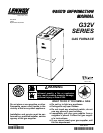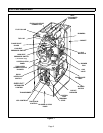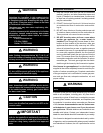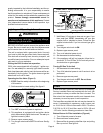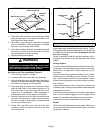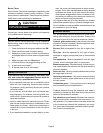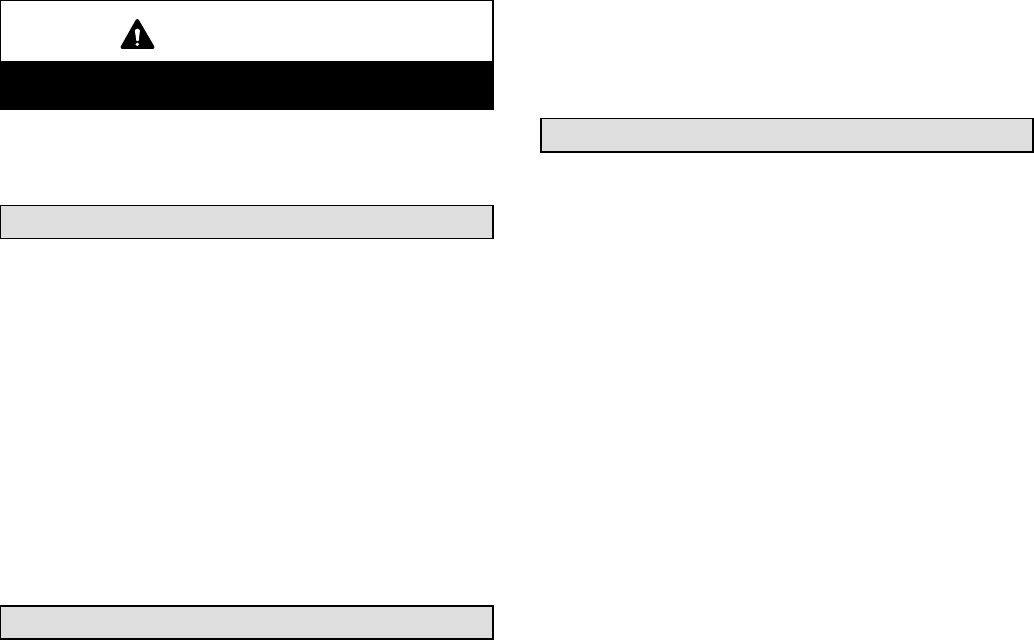
Page 6
Burner Flame
Burner Flame - Start burner and allow to operate for a few
minutes to establish normal burning conditions. Check
burner flame by observation. Flame should be predomiĆ
nantly blue in color and strong in appearance.
CAUTION
Periodically look through the flame sight glass to
check the burner flame.
Contact your Lennox dealer for a periodic unit inspection
by a qualified service technician.
Service Reminders
Call your Lennox service technician if unit is inoperative.
Before calling, always check the following to be sure serĆ
vice is required.
1 - Check that electrical disconnect switches are ON.
2 - Check room thermostat for proper setting.
3 - Replace any blown fuses or reset circuit breakers.
Investigate reason for blown fuses or tripped breakĆ
ers.
4 - Make sure gas valve is in ON position.
5 - Air filter should not be plugged limiting air flow.
6 - Is gas turned on at meter?
7 - Is manual main shutĆoff valve open?
Safety Precautions
If you discover any of the following, shut down your
unit, and contact an independent Lennox dealer for
an inspection by a qualified technician.
D If you repeatedly hear any new or unfamiliar sounds
while your unit is operating, there may be a problem.
For example, poorly performing burners can produce
unfamiliar noises.
D If you smell any unusual odors, your unit may be operĆ
ating improperly. For example, units can give off unfaĆ
miliar odors if components are required to operate in
abnormal conditions.
D Look for visible signs of a malfunctioning unit. ExamĆ
ples include unusual amounts of condensate on winĆ
dows inside your house, visibly burnt components or
unusual dirt or rust accumulations on the vent pipe or
in the unit.
D If you experience headache, nausea, fatigue, or dizziĆ
ness, the cause could be exposure to carbon monoxĆ
ide gas. This is often misdiagnosed as the flu because
symptoms are similar. If you suffer from flu-like sympĆ
toms that are exaggerated at home, but seem to subĆ
side while you are away from the house, exposure to
carbon monoxide could be the cause.
Your vigilance may pay off in early detection of a problem
before either personal injury or property damage occurs.
Do not hesitate to contact a qualified service technician as
an investment in your well being.
Planned Service
You should expect a service technician to check the folĆ
lowing items during an annual inspection. Power to the
unit must be shut off for the service technician's safety.
Fresh air grilles and louvers (on the unit and in the room
where the furnace is installed) - Must be open and unobĆ
structed to provide combustion air.
Burners- Must be inspected for rust, dirt, or signs of waĆ
ter.
Vent pipe - Must be inspected for dirt, signs of water,
damaged or sagging unsupported pipe, or disconnected
joints.
Unit appearance - Must be inspected for rust, dirt, signs
of water, burnt or damaged wires, or components.
Blower access door - Must be properly in place and proĆ
vide a seal between the return air and the room where the
furnace is installed.
Return air duct - Must be properly attached and provide
an airtight seal to the unit.
Operating performance - Unit must be observed during
operation to monitor proper performance of the unit and
the vent system.
Combustion gases - Flue products must be analyzed
and compared to the unit specifications.
Problems detected during the inspection may make it
necessary to temporarily shut down the furnace until the
items can be repaired or replaced.
Pay attention to your furnace. Situations can arise beĆ
tween annual furnace inspections that may result in unĆ
safe operation. For instance, items innocently stored next
to the furnace may obstruct the combustion air supply.
This could cause incomplete combustion and the producĆ
tion of carbon monoxide gas.



